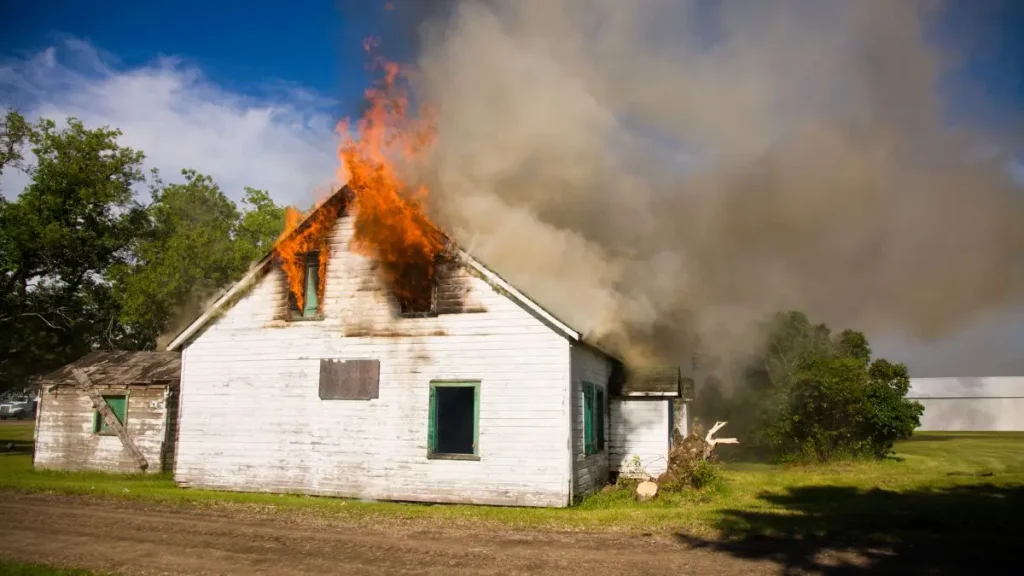Massive Fire Destroys Tennessee Home While Owners Were Out of Town
Imagine waking up to the news that your home — the place where you’ve built memories, stored irreplaceable keepsakes, and found comfort — has been destroyed. This was the reality for homeowners in Tipton County, Indiana, on the early morning of June 28, when a massive fire broke out in their home while they were away.
At around 1:30 a.m., fire crews rushed to the scene near Elwood, only to find a blazing inferno threatening everything in its path.
As firefighters battled thick smoke and towering flames, the homeowners were left to process the unimaginable: their home was gone, reduced to rubble. Luckily, no one was injured, but that doesn’t lessen the devastation of losing everything you’ve worked so hard for.
Fires like this remind us how quickly life can change, how vulnerable we all are, and how critical it is to be prepared for such a disaster.
In this article, we’ll dive deep into what happened that night, explore the emotional toll of losing a home to fire, and offer tips on how you can safeguard your home and family from similar threats. Because while you can’t always prevent the worst from happening, you can take steps today to protect everything you hold dear.
What Happened? Details of the Tipton County Fire
On the night of June 28, around 1:30 a.m., the residents of Tipton County were unaware of the horror unfolding at their home. A massive fire had ignited, sending flames and thick smoke rising into the sky.
By the time fire crews from multiple towns — Wildcat Township, Madison Township, Cicero Township, and Elwood — arrived on the scene, the situation was already dire.
It was no small fire. Crews had to call for backup, and additional departments were needed to bring the blaze under control. Fortunately, the fire was contained without any injuries reported. The homeowners, as it turned out, were out of town when the fire started, sparing them from harm but leaving them with the heartbreaking news that their home was gone.
This tragic event highlights just how quickly fire can spread and how vulnerable even the most prepared homeowner can be. According to reports from WTHR, which covered the fire, the impact was severe, but no lives were lost in the blaze . However, the emotional and financial toll of losing a home can be overwhelming.
In a similar tragic event, a house fire in Montgomery County left a family of four homeless. You can read more about that incident here.
The Emotional Impact: What Happens When a Home is Destroyed?
When a fire devastates a home, it’s more than just about losing physical property — it’s about losing your sense of security. The homeowners in Tipton County, who were away when the fire broke out, were not there to witness the horror firsthand, but that doesn’t mean the aftermath was any easier. Imagine coming home to find your home reduced to ashes. The loss is real, even if you weren’t physically present.
The emotional weight of this disaster extends beyond the immediate shock. There’s the grief of losing priceless items — family heirlooms, photos, documents, and even the little everyday comforts that make a house feel like a home. While the fire didn’t claim any lives, the destruction left a permanent mark.
Facebook posts from local fire rescue teams paint a vivid picture of the destruction, showing how deeply fires can affect entire communities .
You might not think about it often, but a house is more than just four walls — it’s a place full of memories. That loss can shake anyone to their core. Even if the homeowners are grateful to be safe, they are now faced with the difficult task of rebuilding their lives from the ground up.
This isn’t just about the loss of property; it’s about how we rebuild emotionally after a crisis like this.
If you’ve ever wondered what steps you should take after a fatal fire, our previous article on a fatal Bronx home fire provides detailed guidance.
Fire Safety: What Could Have Prevented This Disaster?
You might be wondering: could this fire have been prevented? The truth is, there’s no way to know for sure. But there are steps you can take right now to reduce the risk of a similar disaster striking your home.
First things first: make sure your home is equipped with working smoke detectors. They might seem like a small thing, but they can be the difference between life and death in the event of a fire.
Alongside smoke detectors, fire extinguishers in key areas of your home — the kitchen, near fireplaces, and in hallways — are vital. You never know when a small spark could turn into a dangerous blaze.
Another important step is having a fire escape plan. Sit down with your family and discuss how to get out of the house if there’s a fire. Practice it regularly, so everyone knows what to do when time is of the essence.
These aren’t just precautions; they’re life-saving steps that could prevent you from facing the same devastating situation the Tipton County homeowners did.
But it’s not just about fire alarms and escape routes. Fire-resistant materials can make a big difference too. If you’re building or renovating, consider materials that are more resistant to flames. Things like metal roofs or fireproof doors can significantly slow down the spread of a fire.
Have you ever faced a fire emergency or dealt with the aftermath of a fire? We’d love to hear your thoughts and any tips you might have. Drop your comments below — your experiences could help others prepare better!
What to Do If Your Home is Destroyed in a Fire: A Guide

Losing a home to a fire is a nightmare no one wants to experience, but it’s important to know what to do if the unthinkable happens. First, make sure your family is safe and accounted for. If anyone was inside when the fire started, immediately contact emergency services.
Once you’re safe, the next priority is to contact your insurance company. Start the claim process as soon as possible. Insurance might not bring back your memories, but it can help you rebuild. Keep records of what was lost — photos, receipts, and any other documentation — to ensure you get the compensation you need.
In the days that follow, you’ll need to figure out how to move forward. That might mean staying with relatives or finding temporary housing while you get back on your feet. You’ll also need to start the emotional recovery process. Reach out to support groups or counselors who specialize in helping people cope with the trauma of losing their homes.
Remember, it’s not just about rebuilding your physical space — it’s about rebuilding your life. Support is out there, so don’t hesitate to lean on friends, family, and professionals who can help guide you through the emotional and logistical challenges ahead.
Sometimes, having a community to lean on makes all the difference. If you’re looking for real-time support and updates on home safety, you can join some social media groups like Facebook groups and WhatsApp channel where you will get the latest updates about your area.
Resources for Fire Victims: Support and Insurance
After a fire, you’ll need all the help you can get. From dealing with insurance claims to finding emotional support, there are resources available to help you through every step of the process.
One of the first things you’ll need to do is contact your insurance company. They can guide you through the claims process and help you assess the damage. Many insurance companies also offer 24/7 support for emergencies like house fires, so don’t hesitate to reach out.
Additionally, local fire departments and non-profits often provide assistance to fire victims. Whether it’s financial support, temporary housing, or even just emotional counseling, there are organizations ready to help. Look for national and local disaster relief services like the Red Cross, or find local charities that specialize in supporting fire victims.
Lastly, don’t forget about your community. You’d be amazed how much local support can make a difference. Whether it’s through donations, temporary shelter, or just a listening ear, your community can help you heal and rebuild after such a tragedy.
In our coverage of the devastating row house fire in Northeast DC, we discuss the importance of fire prevention measures that could have saved lives.
Protecting Your Home from Fires: Key Takeaways

After reading about the devastating fire in Tipton County, it’s clear that we can never be too prepared. Fires can strike unexpectedly, and while we can’t always prevent them, we can take steps to protect our homes and families.
From smoke detectors and fire extinguishers to fire-resistant materials and escape plans, these simple actions can make all the difference when disaster strikes.
Now is the time to take action. Don’t wait until it’s too late to think about fire safety. Take a few moments today to check your smoke alarms, review your fire escape plan, and make sure your home is as fire-resistant as possible.
By taking these precautions, you’re not just protecting your property — you’re safeguarding your family’s future.
Don’t wait for the worst to happen. Start preparing now.
If you’re looking for more resources on fire prevention or dealing with fire insurance, feel free to visit our website for detailed guides and tips.
Disclaimer: The information in this article is intended for informational purposes only. While we strive to provide accurate and up-to-date advice, we recommend consulting with fire safety experts or local authorities for specific guidance on protecting your home from fire risks. Always follow local regulations and professional advice when implementing fire safety measures.


